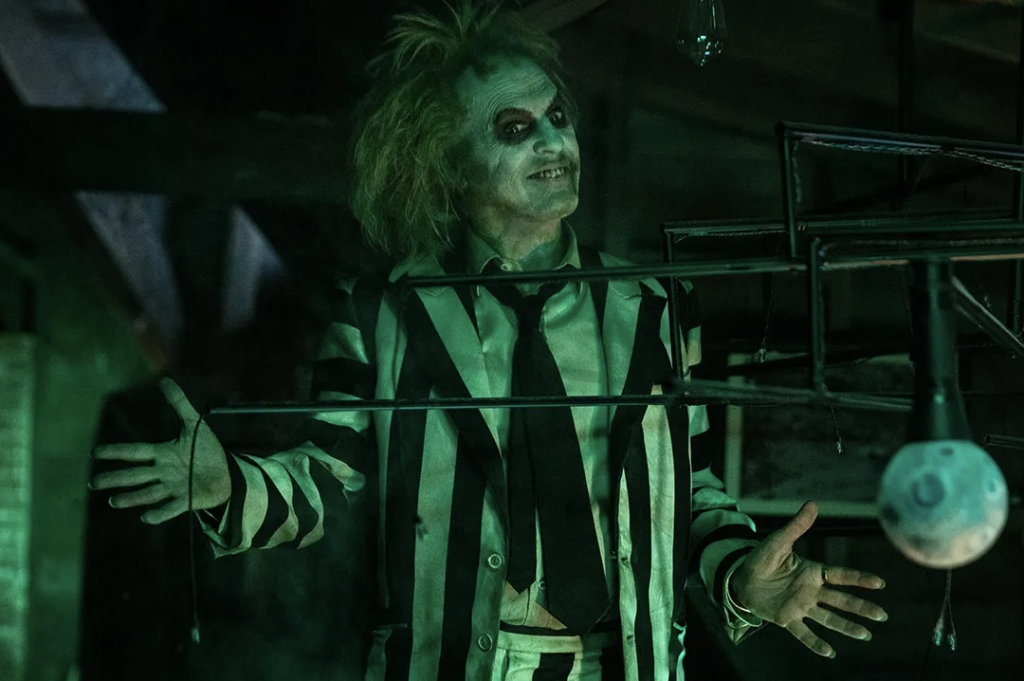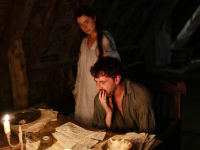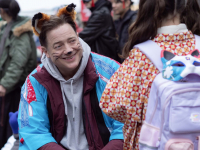Lydia Deetz’s life is thrown into disarray after a family tragedy and she finds herself returning to a life she once knew in rural America. Events take her further and further from any semblance of normality, as the ‘ghost with the most’ returns with more tantalising tricks and treats for the silver screen.
The original Beetlejuice is what put Tim Burton on the map as a director. Pee-wee’s Big Adventure was a commercial success that gave him credibility, but it was Beetlejuice where his imagination was really allowed to run riot with his whimsical gothic sensibilities. Beetlejuice is the place where the groundwork was laid that underpinned the style and themes of many, if not all of Burton’s films that followed. He’s utilised the same framework for the sequel as he did with the first, focusing on a short shooting schedule, encouraging improvisation and use of practice effects.
Centre stage is Wynona Ryder reprising her role as Lydia Deetz. Transformed from the archetypal misfit goth teenager, she is now a spiritual medium (and TV host) whose life has been haunted by both the dead and death itself. Gone is the bright eyed but heavy hearted teenager, Lydia now has the full weight of the world on her shoulders as she strives to balance her own relations with her dysfunctional family, career and romantic interest, all of which are taking their toll. At least relations appear to have improved with step mother Delia, once again played perfectly by Catherine O’Hara, whose artistic endeavours and behaviours are as brilliantly eccentric and absurd as ever.
Lydia is now a mother herself to her own skeptical and rebellious teenage daughter Astrid (Jenna Ortega) with whom she has a tumultuous relationship. There are a lot of parallels between Astrid and Ortega’s other wayward teenage alter ego, Wednesday Addams. It’s a role she shines in, to the point at which she risks being type cast although if that’s by Tim Burton there are certainly worse fates. Astrid is a somewhat warmer unmanageable youth than Wednesday and Ortega plays her with a significant difference to justify in all due credit.
There’s a host of other new characters, highlights include Willem Dafoe as Wolf Jackson, a deceased actor turned investigative detective, reliving his favourite roles in the afterlife in marvellous comic fashion, channeling both Sherlock Holmes and The Naked Gun. Monica Bellucci is Delores, the femme fatale who brings her own flavour of voodoo into the mix as she stalks her target with the determination of a sort of Frankenstein Terminator. The two charming new male characters in the world of the Deetz’s, Rory (Justin Theroux) and Jeremy (Arthur Conti) are both characters that play clever parodies that touch on the relevant social issues of control and deception, with a shovel full of narcissism thrown in on each.
And of course the star of the show, Michael Keaton is back in the black and white striped suit as Beetlejuice, which is an idiosyncratic character he plays with the ease of slipping into a favourite jacket. It’s a joy to see him revel and roll around the movie, although we’ve got a mellower version of the uninhibited bio exorcist this time for better or worse. Throughout you can see elements of the live improvisation break through as the actors explore their characters in front of the camera and this brings a raw, unpolished edge to the production which is a rare quality not often seen in today’s Hollywood films.
The other big name put on the filmic map by 1988’s Beetlejuice was Danny Elfman for his score. He’s been collaborating with Burton since his first film and here he’s modernised the theme which is characterised by staccato strings and slides with a few electronic elements that seamlessly complement the on screen action. There are many standout moments on the soundtrack too, from Burton’s personal playlists which at first seem surprising choices, but fits the mood of the scenes superbly.
The Beetlejuice universe is a place that’s a law unto itself; it’s an undead Alice In Wonderland. The spooky sets, practical effects, prosthetics and stop motion animations are a delight on the eyes. There’s a few stylised vignettes, some of which seem to go off on novel tangents that serve to indulge the director more than for any other apparent purpose, but remain highly entertaining nonetheless. Overall it feels like a fresh take rather than a rehashing of old material that doesn’t rely on nostalgia to work, although it can still be found. There’s a more sophisticated narrative than the original presumably to cater for modern audiences, but how well this update will age remains to be seen.
Monumental levels of skill and talent that have gone into this well crafted and tastefully made movie. At the heart of this hysterical ghost train ride is a subtle cautionary tale, warning us not of the dead, but the living. Whether you’re familiar with the works of Tim Burton or not, there is something for everyone here, but if you are no doubt it will speak to you on many levels.
Author: Dan, Kingston Store







